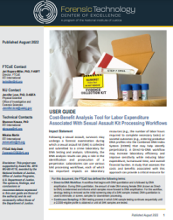Sexual assault
Findings from the Federal, State, and Tribal Response to Violence Against Women in Indian Country Studies
Shedding Light on Assault
Examining Walking-Waiting Sexual Assaults from Previously Untested Sexual Assault Kits: The Intersection of Stranger and Outdoor Sexual Assaults
Needs Assessment of Forensic Laboratories and Medical Examiner/Coroner Offices: A Report to Congress
The Accuracy of Arrest Data in the National Incident-Based Reporting System (NIBRS)
Guidance Document on Considerations for Photographic Documentation in Sexual Assault Cases
Cost-Benefit Analysis Tool for Labor Expenditure Associated With Sexual Assault Kit Processing Workflows
Campus Climate and Sexual Violence Experiences of Students Attending Historically Black Colleges and Universities
Gender-Based Violence and the Latino Community
Just Science Podcast: Just Solving Cold Cases with Forensic Genetic Genealogy
National Assessment of the Relationship Between Tip Line Implementation and School Safety Outcomes
An exploratory study of violence and aggression against teachers in middle and high schools: Prevalence, predictors, and negative consequences
The Link Between the SAMFE and Police Perceptions of Victim Credibility
Risk for dating violence and sexual assault over time: The role of college and prior experiences with violence
Probing menstrual bloodstain aging with fluorescence spectroscopy
A Qualitative Examination of Collaborative Infrastructure within Sexual Assault Response Teams
Tribal Crime, Justice, and Safety, Part 2
Stacy Lee Reynolds and Christine (Tina) Crossland continue their discussion of tribal crime, justice, and safety, including how Native American persons experience crime victimization at higher rates than non-Native people and the jurisdictional complexities in responding to tribal crime, justice, and safety. Read the transcript.
Listen to the first half of Stacy and Tina’s discussion.
Reading and Resources from NIJ
Tribal-Researcher Capacity Building Grants
Interlaboratory Comparison of SpermX and Conventional Differential Extractions
Evaluation of Technology-based Advocacy Services (ETA): Technical Report, Executive Summary
Evaluation of Technology-based Advocacy Services (ETA): Technical Report
Tribal Crime, Justice, and Safety, Part 1
Research indicates that Native American persons experience crime victimization at higher rates than non-Native people. Furthermore, the unique position of American Indian and Alaska Native tribes as both sovereign nations and domestic dependents of the U.S. creates jurisdictional complexities in responding to crime, justice, and safety. Senior social and behavioral scientist Christine (Tina) Crossland discusses NIJ’s research on these topics, especially on the prevention of violence towards American Indians and Alaska Natives. Communications Assistant Stacy Lee Reynolds hosts.







